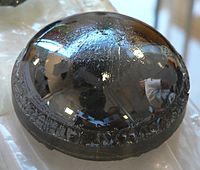
Photo from wikipedia
Abstract Although the confinement of compressed columns with composite materials has been extensively studied during the last decades, scarce research has been conducted in the particular case of reinforcement of… Click to show full abstract
Abstract Although the confinement of compressed columns with composite materials has been extensively studied during the last decades, scarce research has been conducted in the particular case of reinforcement of stone or masonry elements subjected to high temperatures. This work reports an experimental study on the mechanical behavior of cylindrical stone specimens exposed to temperatures of 600 °C and subsequently cooled with two different methods: slow air cooling or rapid water immersion. The effect of confinement by means of carbon or glass fiber reinforced polymers (FRP) is studied. The mechanical properties of the rock are also analyzed by non-destructive tests, which constitute very appropriate techniques when working on heritage buildings. In general terms, it was found that the effect of temperature significantly reduced the strength and elastic modulus of the rock. On the other hand, FRP confinement provided large increases in strength and ultimate strain, compared to unreinforced samples. An important finding of this work is that the response of the confined specimens seems to depend basically on the properties of the FRP laminate, and not on the damage that the stone core may have suffered. Finally, the experimental results are compared with the predictions of analytical confinement models included in the most relevant international design guides. It has been proven that these models seem to provide accurate results in the case of unheated and unaltered stone, although they show larger deviations in the case of high temperature exposed specimens.
Journal Title: Journal of building engineering
Year Published: 2021
Link to full text (if available)
Share on Social Media: Sign Up to like & get
recommendations!